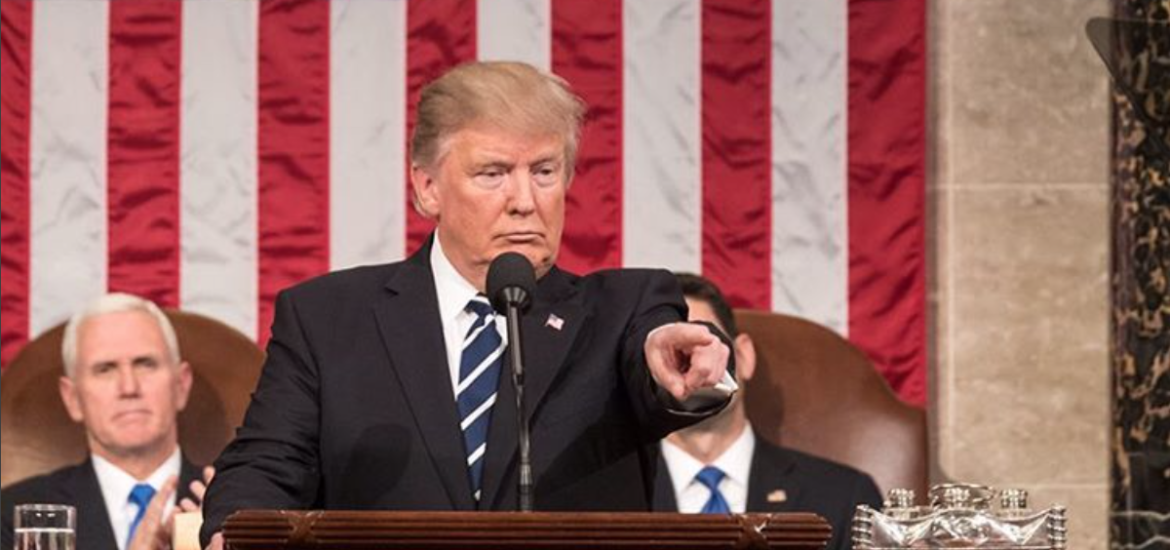President Donald Trump delivered his first congressional address to a joint session of Congress on Feb. 28, 2017, where he proceeded to tactfully discuss immigration, and reforms on taxes and health care. Absent from his speech, however, was an emphasis on the progression and rights of women in the United States. Despite a CNN poll claiming 57% of viewers had a positive reaction to Trump’s speech, women are still wary of their future under his administration. In fact, Democratic women within congress wore white during the President’s address as a way to pay tribute to the suffragettes who fought for women’s right to vote. Lois Frankel, the United States Representative for Florida and Democratic Party member, tells Fortune the decision to wear white is to show women “don’t want to go back, we want to go forward [with women’s rights].”
Trump’s performance at the joint session was the most composed of his political career thus far, and perhaps this was to distract from his lackluster acknowledgment of women’s health concerns as well as their lack of political and economic presence. In the latter half of his speech, Trump says, “My administration wants to work with members of both parties to make child care accessible and affordable, to help ensure new parents that they have paid family leave…to invest in women’s health.” Affordable child care would be a tremendous help to single parents and young mothers, but according to an analysis of the plan done by the Tax Policy Center, “70 percent of benefits go to families with at least $100,000 and 25 percent of benefits go to families with at least $200,000.” The report claims, “few benefits go to the lowest income families who are likely to struggle most with paying for child care.” Perhaps, Trump is unaware that women come in all shapes, sizes, colors, sexualities, and socioeconomic statuses?
In regards to his addressing women’s health, it is nonexistent. There were no specifics provided. He chose to ignore the most important thing women in the United States are currently fighting for: the right to govern their own body. Trump was vocal over the past months concerning his intention to defund the women’s health non-profit, Planned Parenthood, and infamously signed an anti-abortion executive order while surrounded by a majority of men.
This executive order reinstated the Mexico City policy, which ceases funding to international non-governmental organizations designed to provide reproductive health resources. As reported by the Guttmacher Institute, the United States has appropriated nearly $600 million to this cause, allowing 27 million women and couples access to contraceptive resources, and prevents 6 million unintended pregnancies as well as 11,000 maternal deaths. Without this funding, 440,000 fewer women and couples would have access to contraceptives, there would be 30,000 more unsafe abortions and 200 maternal deaths would occur. Trump’s speech followed the massive women’s march in Washington and preceded International Women’s Day, his decision to remain vague on the subject of women’s health sent a clear message regarding the consideration for this group in the United States.
Trump did, however, go into slightly more detail on his support to empower female entrepreneurs. Trump announced that, with the help of Canada’s Prime Minister Justin Trudeau, they, “have formed a council…to help ensure that women entrepreneurs have access to the networks, markets and capital they need to start a business and live out their financial dreams.” Trump and Trudeau are working to launch the United States Canada Council for the Advancement of Women Business Leaders-Female Entrepreneurs. This is an interesting initiative from Trump, who has a track record of dismissing women’s capabilities and so far failed to follow up with his 2015 proposal of a gender balanced Cabinet. Apparently women may be capable of leadership, after all, with the exception of leadership over their body and reproductive rights, of course.
By Abigail Welles

